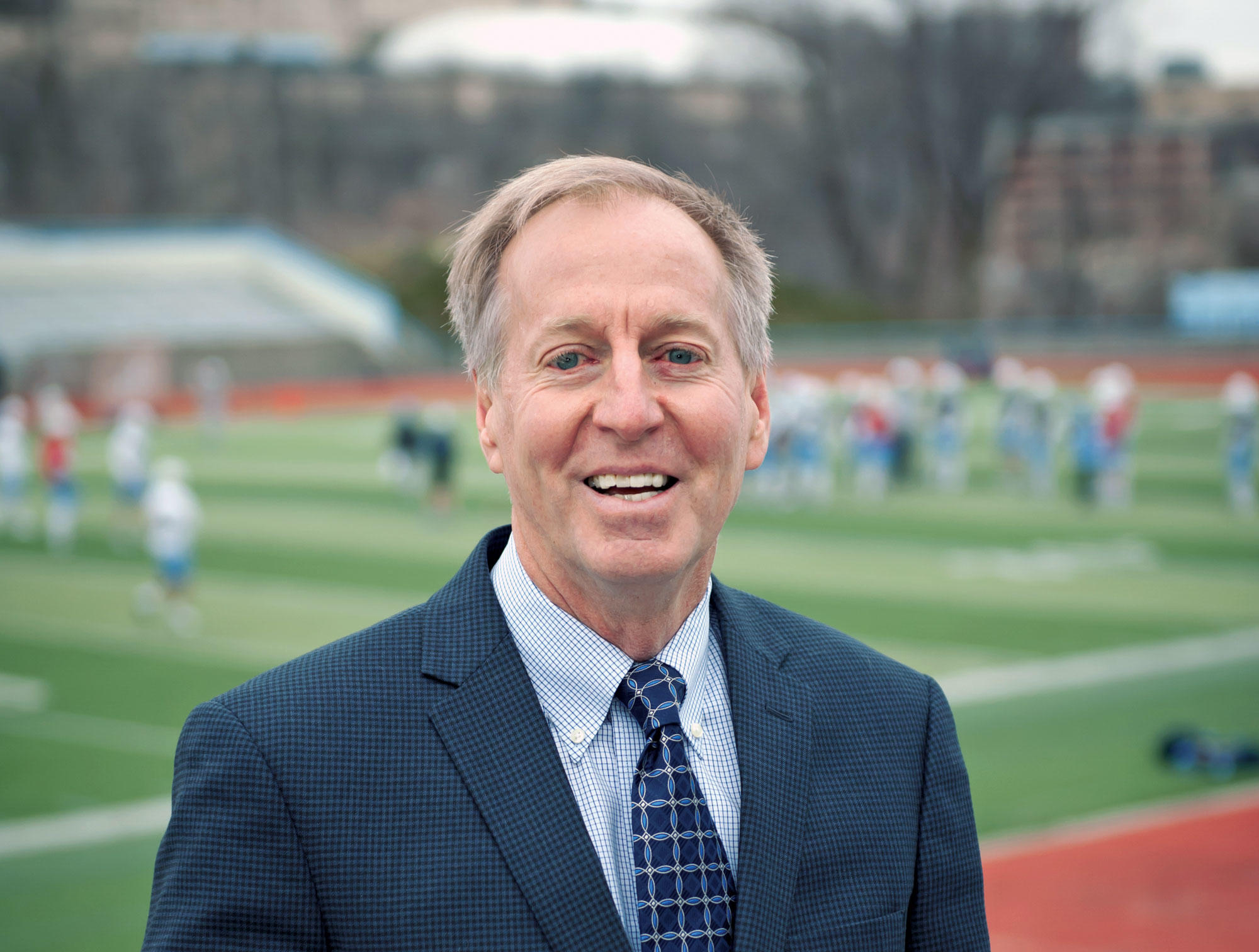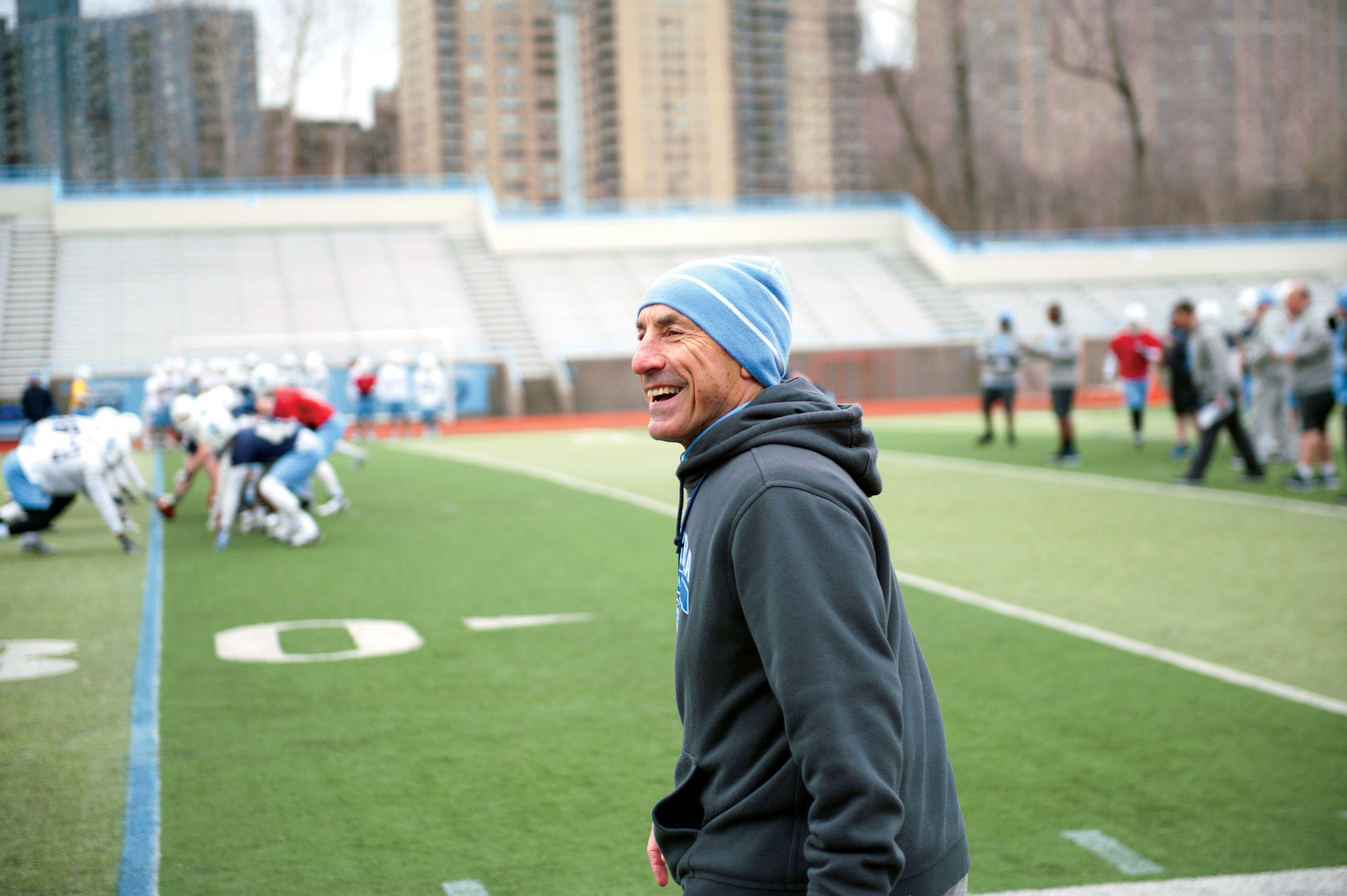Score, Lion, Score: Columbia Hires New Athletic Director, Football Coach
A new era for Columbia athletics began earlier this year as Peter Pilling, an executive from the nation’s largest collegiate sports-marketing company, IMG College, was hired as the University’s athletic director and Al Bagnoli, the former Penn head coach, was recruited to lead the Lions’ football squad.
As a vice president at IMG College, Pilling oversaw multimedia rights and corporate-sponsorship deals for many Division I athletic departments, including those at Brigham Young University, Texas Christian University, Baylor University, and the US Air Force Academy. The job gave him an intimate look at how sports programs at those and other schools are run, he says, and thus helped prepare him to direct his own athletic department. He had been working toward that goal since holding senior positions in the athletic departments at Brigham Young and Villanova in the early 2000s.
“It has always been my dream to serve as an athletic director at a great university,” says Pilling, who holds a master’s degree in sports administration from Ohio University. “What I’ve found at Columbia is an extraordinary opportunity to bring together the highest achievements in teaching, learning, and research with a commitment to excellence in athletics.”
Said President Lee C. Bollinger in announcing Pilling’s hire: “Peter has spent his career working at several of the most respected college sports programs in the country ... I’m confident that his wealth of knowledge, experience, and enthusiasm will help us build on a strong record of achievement and reach the new levels of excellence that we expect in everything we do as a great university.”
Pilling, fifty-six, succeeds M. Dianne Murphy, who served as Columbia’s athletic director for eleven years, a period during which the Lions enjoyed some of their most successful seasons ever. In the spring of 2014, for example, the Lions won their second-straight Ivy League baseball crown, earned an undefeated league championship in men’s tennis, won the men’s Ivy golf title, and brought home a national championship in lightweight rowing. Last winter, the Lions had nationally ranked teams in men’s and women’s tennis, men’s and women’s squash, and men’s and women’s fencing — with both fencing teams finishing the regular season ranked number one in the country.
A notable exception to the Lions’ success under Murphy, however, has been the football team. The Light Blue football squad ran through four different head coaches while winning a total of just twenty-three games during Murphy’s tenure. The last of these head coaches, Pete Mangurian, resigned in December, following a second-straight 0-10 season; Murphy had announced her intention to step down earlier in the fall.
Pilling says that he began identifying potential candidates to replace Mangurian soon after being interviewed for the athletic-director position in December. “It was obvious that addressing the football situation had to be a big priority,” he says. “So I compiled a list of coaches with the experience to build up all aspects of a football program — from recruiting to game preparation to student-athlete development, combined with success on the field.”
At the top of Pilling’s list was Al Bagnoli, who, over the course of twenty-three seasons leading the University of Pennsylvania Quakers, had compiled nine Ivy titles and a league record of 112-49, making him the second-winningest head football coach in Ivy history. Bagnoli had retired from Penn just two months earlier but was rumored to be regretting his decision to step away from the game.
“I heard from an old colleague, Villanova head coach Andy Talley, that Al might be interested,” says Pilling. “So I called him up and said, ‘Al, just imagine for a moment that I become the new athletic director at Columbia and imagine that you miss being on the field.’ I sensed his passion to continue coaching. For the next hour, we talked about what would need to happen for Columbia to have a successful football program.”
On February 23, the day after Pilling officially began his new job, the University held a press conference to announce that Al Bagnoli would be its next football coach.
“My first goal is to make football fun again, and I mean that,” said Bagnoli, a spritely and affable sixty-two-year-old, as he addressed a few dozen reporters, administrators, and Lions football players at Faculty House. “I say that to our kids, and you’ll hear me say this all the time. Practice ought to be the best two hours of your day.”
Body and mind
During his time at Penn, Bagnoli earned a reputation as a fierce competitor, one capable of coaxing extraordinary performances out of his players and finding ways to beat teams that, man for man, might have been expected to overpower the Quakers. He was also regarded as an unusually gracious leader, who, in post-game interviews, would blame himself for every loss and credit his players for every win. In the locker room, after schooling his players in Xs and Os, he would often stick around to chat with them about the stresses of school work, planning a career, or being away from home for the first time.
“He finds a good balance between being supportive and getting down to business,” says Billy Ragone, a former Quaker quarterback who won Ivy League titles with Bagnoli in 2009, 2010, and 2012. “Come Saturday, you’re expected to win. That’s the attitude. He instills in everybody the belief that you can win every game.”
Pilling says he recruited Bagnoli as much for his character as for his win-loss record. “He’s someone who’s concerned about victories on the field, victories in the classroom, and victories in life — and his players really see that,” says Pilling. “I had an opportunity to talk to his former players, former coaches, his former athletic director, and that was the consistent message.”
At a recent workout session at the Campbell Sports Center, the Lions’ training facility at the Baker Athletics Complex in northern Manhattan, members of the football team talked about how Bagnoli’s arrival has inspired a new sense of optimism in their clubhouse.
“Everybody is excited,” said Cameron Molina, a junior running back who was the Lions’ leading rusher last fall. “Going 0-10 the past couple of years was extremely painful, there’s no question about it. And when things go bad like that, it’s inevitable that a team’s morale will drop. Now we feel like we have something to look forward to again.”
Anders Hill, a sophomore quarterback who played well off the bench in several games last fall, said the Lions are eager to prove how much better they are than last season’s record suggests.
“The guys on this team have been winning football games their whole lives and still have a winning mentality,” said Hill, a cannon-armed phenom from Boulder, Colorado, who was his state’s high-school quarterback of the year in 2013. “We’re mentally tough. We promised each other during the off-season to work really hard and put last fall behind us. We want to help turn this program around.”
The gridiron and beyond
Pilling and Bagnoli are currently developing a long-term plan to revamp the Lions football team. Some of their changes are already being implemented: they have added to the athletics department a strength-and-conditioning coach and a speed-and-agility trainer, both of whom will work with football players and other varsity athletes.
Pilling says the University is also committed to paying the football team’s assistant coaches more competitive salaries than they received in the past. He points out that this was among the recommendations made by outside consultant Rick Taylor, the former Boston University football coach and athletic director whom President Bollinger commissioned to conduct a top-to-bottom review of the football program last fall. That report’s central recommendation was that Columbia devote more resources to the program.
“It’s clear that the University, under President Bollinger, is determined to find this team the resources that it needs to be successful,” Pilling says. “One way we hope to do this is by soliciting more donations from alumni. This will be instrumental in boosting the assistant coaches’ salaries, which, in turn, will help us retain the best people.”
Pilling says he hopes to increase fundraising for all Columbia athletic programs — from its thirty one varsity teams to the physical-education and wellness programs that serve thousands of undergraduates every year. But raising money for the football team is especially critical, he says, since its struggles have at times threatened to overshadow the accomplishments of other Lions teams.
“Seeing our football team succeed will re-focus the public’s attention on the tremendous achievements of so many of our teams,” he says. “The tide is going to rise for everybody.”




